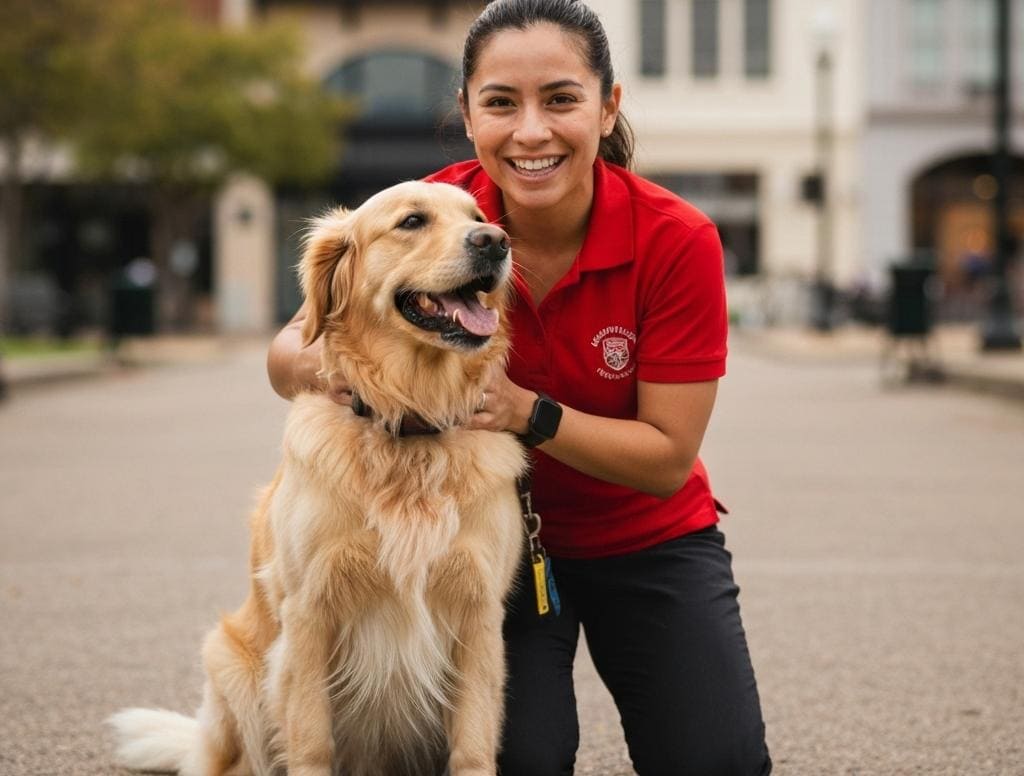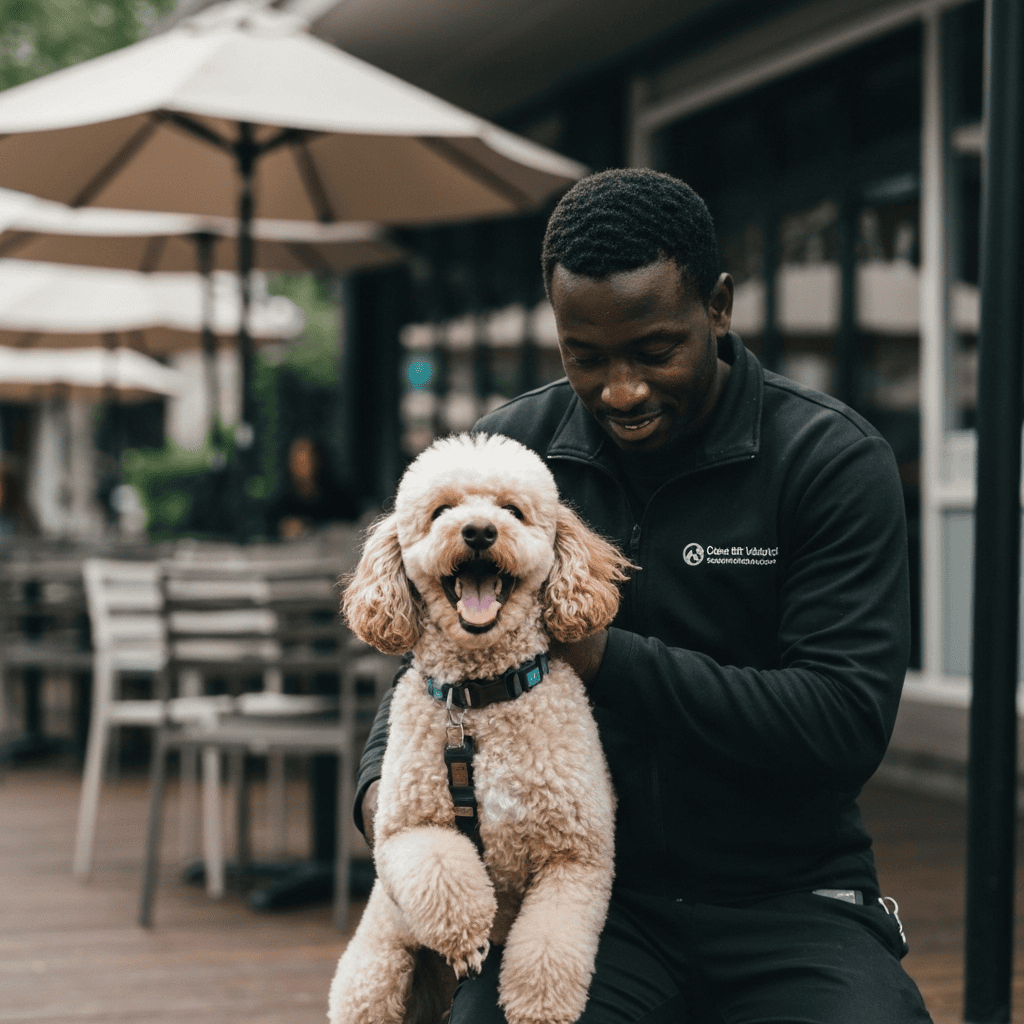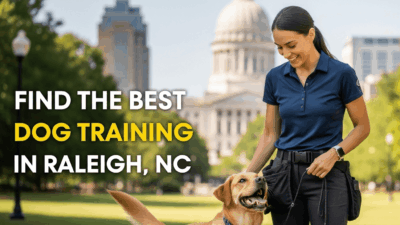Your Complete Guide to Choosing a Dog Trainer in Raleigh
Living with a dog in Raleigh means you’ll need training that works in the real world. Whether you’re walking downtown sidewalks, visiting dog-friendly patios in North Hills, or navigating busy elevators in Glenwood South, your dog needs calm manners and reliable responses to your cues.
Finding the right trainer can feel overwhelming with so many options. This guide will walk you through everything you need to know about dog training in Raleigh, from what to look for in a trainer to local rules and costs, so you can make the best choice for your dog.
What Makes a Great Dog Trainer
The best trainers use methods that build your dog’s confidence instead of breaking it down. Look for someone who focuses on positive reinforcement training because dogs learn faster and with less stress when they’re motivated by good things happening.
Credentials matter, but they’re not everything. Still, they give you a good sense of whether a trainer has invested in real education. Look for certifications like KPA-CTP, CPDT-KA, IAABC-CDBC, or CBCC-KA. These show the trainer has studied how dogs actually learn and behave.
But here’s what really matters: does the trainer understand Raleigh life? Your dog needs to handle greenway crowds, outdoor dining distractions, and apartment living. A good trainer will help you practice in real situations, not just in a sterile classroom.
If you’re interested in in-home dog training, make sure the trainer covers your area without charging huge travel fees, especially if you’re in the outer Wake County suburbs.
Training Methods That Actually Work

Most Raleigh dogs need help with everyday city manners more than fancy tricks. Here’s what actually makes life better for both of you.
Basic obedience covers the essentials: sit, down, stay, walking nicely on leash, staying in place, and coming when called. These aren’t just commands, they’re life skills that make everything from vet visits to patio dining possible.
Puppy training starts early with socialization to city sounds, different surfaces, and polite greetings with people. Good programs also tackle potty training and bite inhibition before bad habits stick. Keep sessions short since puppies have tiny attention spans.
Behavior modification helps dogs who are scared, reactive, or aggressive. This takes patience and skill as trainers slowly change how your dog feels about their triggers. It’s not quick, but it works when done right.
Leash training in Raleigh means starting on quiet neighborhood streets and gradually working up to busier areas like Glenwood Avenue or around Crabtree Valley Mall. Your dog needs to handle bikes, joggers, and other dogs calmly.
Separation anxiety requires a specific plan to gradually build your dog’s confidence when alone. Random tips from the internet usually make this worse, so get professional help.
If you’re interested in therapy dog training, find a certified dog trainer who can explain what’s actually required and give you realistic timelines. Not every dog is cut out for this work, and that’s okay.
Stay away from trainers who use shock collars, choke chains, or intimidation. These methods might look like they work quickly, but they often create new problems and can make fearful dogs worse.
What Dog Training Costs in Raleigh (2025 Prices)
Training costs depend on the trainer’s experience, session length, and whether you choose group classes, private lessons, or intensive programs. Here’s what dog owners in Raleigh typically pay.
| Service Type | Average Cost (Raleigh Area) |
|---|---|
| Group classes (4–6 weeks) | $170 – $320 |
| Private lessons (60–90 minutes) | $110 – $200 per session |
| Puppy classes or starter package (4–6 lessons) | $350 – $650 total |
| Day training (trainer works dog, then coaches you) | $500 – $1,000 per week |
| Board and train (2–4 weeks) | $2,000 – $4,500 total |
| Behavior evaluation for reactivity or fear | $150 – $275 initial visit |
| In-home travel fee (when applicable) | $0 – $40 per visit |
Many trainers offer brief phone consultations or limited free consultations to see if you’re a good fit. Expect to pay more if your dog has complex behavioral issues or if you want a highly experienced professional dog trainer with advanced certifications.
Questions to Ask Before You Hire
Don’t be shy about asking detailed questions. A good trainer will appreciate that you’re doing your homework.
- What methods do you use, and how do you keep training positive for dogs?
- What certifications do you hold, like CPDT-KA or KPA-CTP?
- How will you customize the training plan for my specific goals and living situation?
- Do you offer in-home sessions, group classes, or day training, and which would work best for my dog?
- How will we track progress and know when to make training harder?
- What exactly is included in each session or package, and are there hidden fees?
- Do you carry liability insurance, and can you show me proof?
- For behavior problems, do you work with veterinarians when needed?
- What homework will I need to do between sessions?
Local Laws Every Raleigh Dog Owner Should Know
Understanding local rules helps you train effectively and stay out of trouble with animal control.
Leash laws in Raleigh require dogs to be leashed in all public areas except designated off-leash dog parks. This means you can’t practice recall training in regular parks, so plan accordingly. Check Wake County Animal Services for current ordinances.
Rabies vaccination is required by North Carolina law for all dogs. You’ll need current vaccination records for training classes and boarding. Get details at NC DHHS Rabies.
ID and tags help get lost dogs home quickly. Wake County issues rabies tags, and microchipping is strongly recommended. Keep your contact information current with the microchip company.
Noise complaints from excessive barking can lead to fines and legal troubles. Good training and mental enrichment prevent most barking problems, especially important in apartments and townhomes.
Park usage for training is generally fine for casual practice, but commercial training classes in city parks may need permits from Raleigh Parks and Recreation.
North Carolina doesn’t require special licenses for dog trainers, which means anyone can call themselves a trainer. Look for liability insurance and proper credentials to protect yourself.
Helpful Raleigh Resources for Dog Training
These local spots give you great places to practice what you’re learning in class.
- Millbrook Exchange Dog Park (fenced areas for large and small dogs) — City of Raleigh page
- Oakwood Dog Park near Historic Oakwood — City of Raleigh page
- Carolina Pines Dog Park off Lake Wheeler Road — City of Raleigh page
- Dix Park Dog Park (check current status before visiting) — Dix Park Dog Park
- William B. Umstead State Park for leashed training walks — NC State Parks info
- Lake Crabtree County Park for scenic leashed practice — Park details
- Wake County Animal Services for vaccines and resources — Wake County Animal Services
Making Your Final Decision
Choose a trainer who listens to your specific goals and explains their plan in simple terms. The best trainers show you how to practice at home and in real Raleigh locations like greenways, stores, and apartment buildings.
Experience with continuing education matters, especially for behavior problems. Trainers with advanced certifications like IAABC-CDBC or CBCC-KA often have deeper knowledge for handling fear, reactivity, and aggressive dog training cases safely.
Group classes versus in-home dog training each have advantages. Group classes provide controlled distractions and socialization opportunities. In-home training works better for house manners, door greeting problems, and practicing leash skills in your actual neighborhood.

FAQs
How much does in-home dog training cost in Raleigh?
Most trainers charge $110 to $200 per session for 60 to 90 minutes. You might pay extra travel fees if you live far from the trainer’s usual service area, especially in outer Wake County.
Is in-home dog training worth the extra cost?
Yes, if you’re dealing with house manners, leash pulling in your neighborhood, or specific behavioral issues. Working in your actual environment speeds up progress because your dog doesn’t have to figure out how to apply what they learned somewhere else.
Can I pay someone to potty train my puppy?
Many trainers offer puppy packages or day training programs that jump-start house training, crate training, and basic routines. But you’ll still need to follow through consistently between sessions or the progress won’t stick.
What is the 3-3-3 rule for dogs?
This guideline suggests new dogs need about 3 days to decompress from stress, 3 weeks to learn household routines, and 3 months to fully settle in. Be patient during this adjustment period and keep training sessions short and positive.
How long will it take to see results?
Basic obedience skills typically take 4 to 8 weeks with daily practice sessions. Behavioral issues like reactivity or anxiety take much longer because you’re changing deeply ingrained emotional responses, not just teaching commands.
What should I bring to group classes?
Pack a flat collar or front-clip harness, 6-foot leash (not retractable), small high-value treats, water bowl, and vaccination records if required. Leave toys at home unless the trainer specifically requests them.
What’s the leash law in Raleigh?
Dogs must be leashed in all public spaces within Raleigh city limits unless you’re inside a designated off-leash dog park. This includes greenways, regular parks, and all city streets.
Do I need a dog license in Wake County?
Wake County doesn’t require separate pet licenses currently. You do need current rabies vaccination and should consider microchipping. Check Wake County Animal Services for any updates.
What vaccinations does my dog need in North Carolina?
North Carolina requires current rabies vaccination for all dogs. Your vet will recommend other vaccines based on your dog’s lifestyle and risk factors. State requirements are at NC DHHS Rabies.
Are dog trainers required to be licensed in North Carolina?
No, there’s no state licensing requirement for dog trainers in North Carolina. This makes it even more important to check credentials, insurance, and references yourself. Look for nationally recognized certifications like KPA-CTP or CPDT-KA.
Where can I practice off-leash recall training?
Use fully fenced dog parks like Millbrook Exchange, Oakwood, or Carolina Pines for safe off-leash practice. For open areas, keep your dog on a long training line unless you’re in a specifically designated off-leash zone.
Can I do training sessions at Raleigh dog parks?
Casual training practice is welcome at city dog parks, but keep sessions brief and be considerate of other users. Avoid bringing high-value toys that might cause resource guarding, and give your dog space if they seem overwhelmed.
What trails and parks allow dogs for training practice?
Most Raleigh greenways and many parks allow leashed dogs, making them perfect for training walks. Popular options include trails at William B. Umstead State Park and paths around Lake Crabtree County Park. Always check posted signs for current rules.
The key to success in Raleigh is finding a trainer who understands both dogs and city life. With the right guidance and consistent practice in real-world settings, your dog can learn to handle anything the Triangle throws at them.
